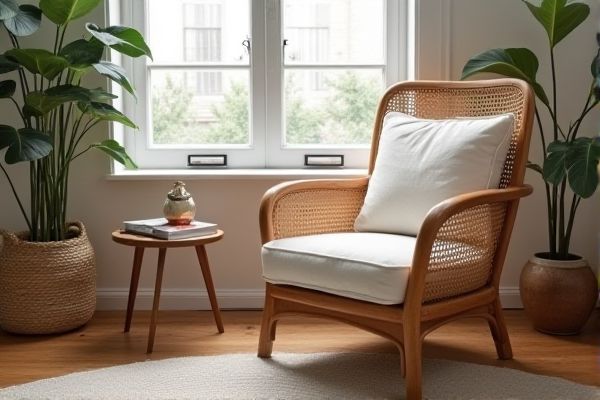
Caned chairs offer a lightweight, breathable seating option with a natural aesthetic, while upholstered chairs provide enhanced comfort and cushioning for prolonged use. Discover which style best suits Your space and needs by reading the rest of the article.
Table of Comparison
| Feature | Caned Chair | Upholstered Chair |
|---|---|---|
| Material | Natural cane or rattan weaving | Fabric, leather, or synthetic padding |
| Comfort | Firm, breathable seating | Soft, cushioned comfort |
| Durability | Resistant to wear but vulnerable to cracking | Durable but fabric may stain or tear |
| Maintenance | Requires regular dusting and occasional tightening | Needs cleaning and occasional reupholstering |
| Style | Classic, airy, vintage appeal | Modern, versatile, luxurious look |
| Weight | Lightweight | Heavier due to padding |
| Breathability | High breathability and ventilation | Low breathability, may retain heat |
| Cost | Generally lower to mid-range | Mid-range to high-end |
Introduction to Caned and Upholstered Chairs
Caned chairs feature a woven rattan or cane seat and backrest, offering breathability and a lightweight design that suits warm climates and casual interiors. Upholstered chairs provide padded comfort with fabric or leather coverings, enhancing elegance and support for prolonged sitting. Your choice depends on desired aesthetic, maintenance level, and comfort needs in your living or dining space.
Historical Overview of Chair Styles
Caned chairs date back to the 17th century, originating during the colonial era when rattan and wicker weaving gained popularity in European furniture design. Upholstered chairs, prevalent since the Renaissance, evolved through the Baroque, Rococo, and Victorian periods, emphasizing comfort with padded cushions and fabric covers. Both styles reflect cultural shifts in craftsmanship and materials, with caned chairs symbolizing lightweight ventilation and upholstered chairs representing luxury and warmth.
Material Differences: Cane vs Upholstery
Caned chairs feature a natural cane material woven tightly to create a breathable, lightweight seating surface ideal for warm climates and offering a vintage aesthetic. Upholstered chairs use fabric, leather, or synthetic materials padded with foam or batting, providing enhanced comfort and a wide range of textures and colors for customizable interior design. Cane offers durability with minimal maintenance, while upholstery requires regular cleaning and can vary significantly in wear resistance depending on the fabric type.
Aesthetic Appeal and Design Versatility
Caned chairs offer a natural, airy aesthetic with intricate weaving that complements both traditional and modern interiors, enhancing your space with a light, textured look. Upholstered chairs provide a wide range of fabric choices, colors, and patterns, offering greater design versatility and comfort tailored to your personal style. Both options can elevate your room's decor, but caned chairs emphasize craftsmanship and openness, while upholstered chairs focus on softness and customization.
Comfort Comparison: Caned vs Upholstered Seating
Upholstered chairs provide superior comfort with padded cushions that offer support and softness ideal for prolonged sitting, while caned chairs feature breathable woven seats that promote airflow and prevent heat buildup. You may find upholstered chairs better suited for cozy environments, whereas caned chairs excel in creating a light, airy feel with moderate comfort. The choice depends on your preference for cushioning versus ventilation in seating comfort.
Durability and Maintenance Considerations
Caned chairs offer exceptional durability due to their sturdy rattan or wicker weaving, making them resistant to wear and easy to maintain with simple dusting or damp cloth cleaning. Upholstered chairs require more frequent care to prevent fabric staining and can suffer from wear and tear, especially in high-traffic areas, necessitating professional cleaning or fabric replacement over time. Choosing between these chair types depends on your environment, with caned chairs favored for low-maintenance durability and upholstered chairs preferred for comfort with higher upkeep demands.
Price Range and Affordability
Caned chairs generally fall within a lower price range due to their simpler construction and use of natural materials like rattan or wicker, making them an affordable option for budget-conscious buyers. Upholstered chairs tend to be more expensive because of the additional costs associated with fabric, padding, and craftsmanship, offering enhanced comfort and style for your living space. Your choice between the two will depend on balancing budget constraints with desired aesthetics and comfort.
Ideal Usage and Placement in the Home
Caned chairs are ideal for warm, casual spaces such as sunrooms, patios, and dining areas where breathability and lightweight design enhance comfort and mobility. Upholstered chairs suit cozy environments like living rooms, bedrooms, and formal dining rooms, offering plush seating that complements decor and provides added warmth. Selecting between caned and upholstered chairs depends on balancing aesthetic appeal with functional needs such as airflow, comfort, and style consistency in specific home zones.
Environmental Impact and Sustainability
Caned chairs, crafted from natural rattan or cane, offer superior environmental benefits due to their renewable materials and biodegradable properties, making them a sustainable choice that reduces landfill waste. Upholstered chairs often involve synthetic fabrics and foams derived from petrochemicals, which contribute to pollution and are more challenging to recycle, increasing their ecological footprint. Choosing a caned chair supports eco-friendly furniture practices and promotes sustainability in your living space.
Choosing the Right Chair for Your Needs
Caned chairs offer lightweight durability and breathability, ideal for warm climates and casual settings. Upholstered chairs provide enhanced comfort and style variety, making them suitable for formal spaces and extended seating. Evaluate factors like environment, comfort preferences, and maintenance requirements to select the perfect chair for your lifestyle.
 homyna.com
homyna.com